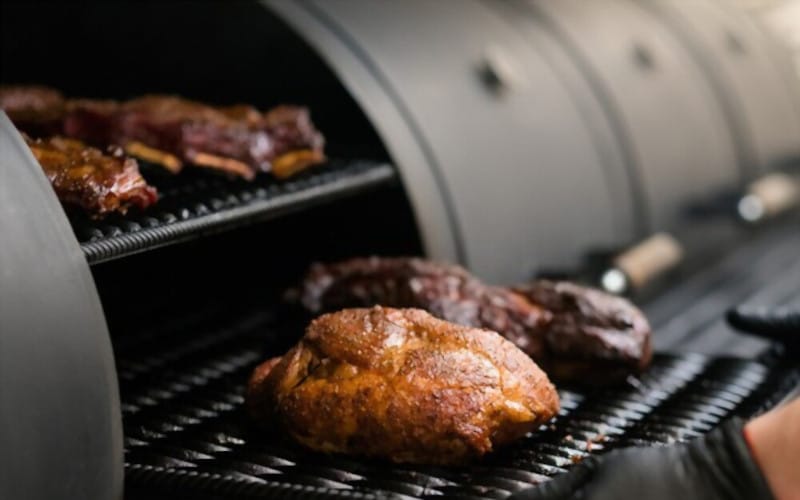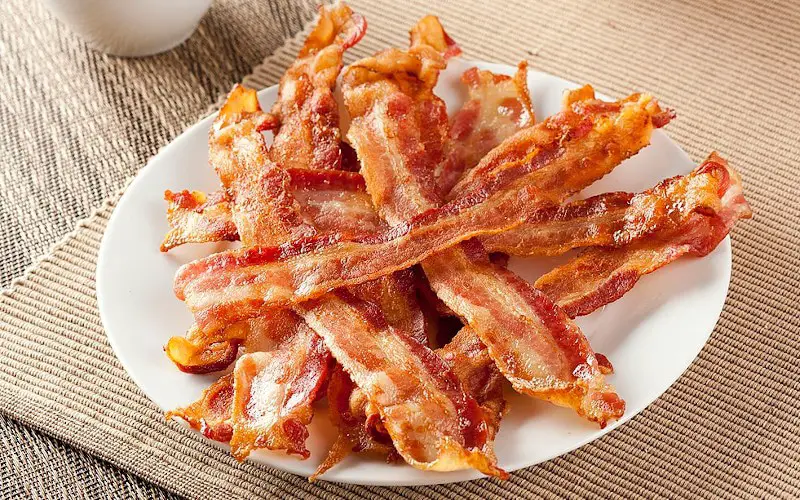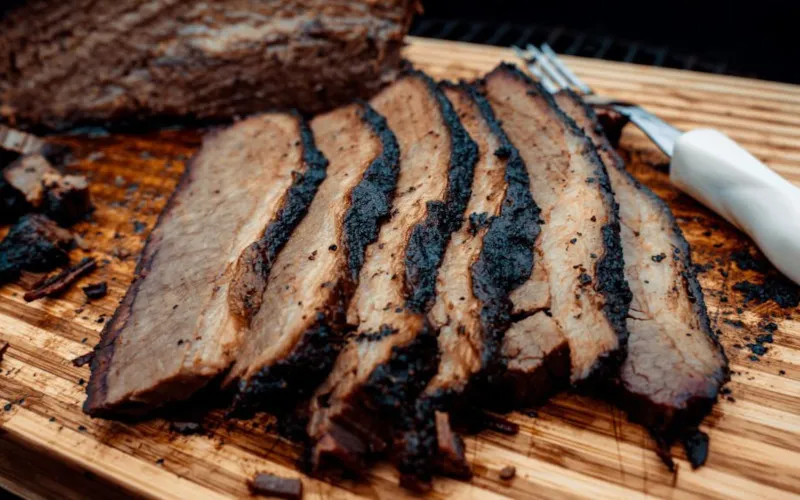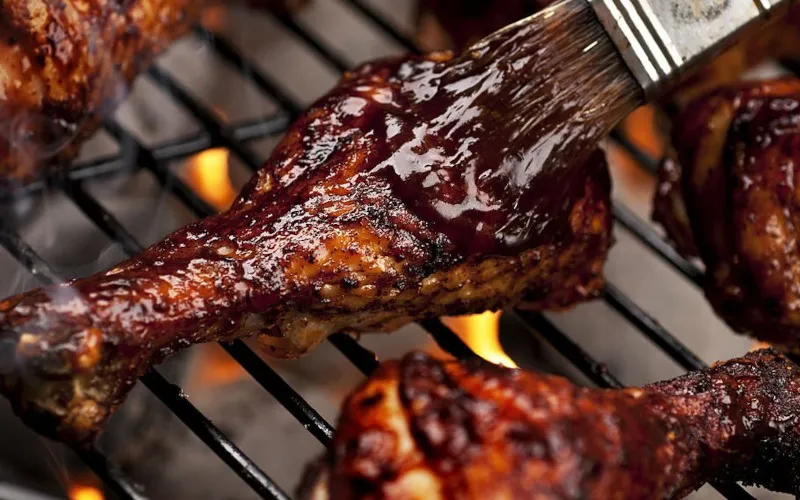Bacon is a type of salt-cured pork. Bacon is cured through a process of salting, smoking, and drying. This curing process gives bacon its distinctive flavor and texture. Pork belly is the most common cut of meat used to make bacon, but other cuts can also be used.
There are two main types of bacon: pork bacon and beef bacon. Both types of bacon are made from cured meats, but the curing process for each type of bacon is slightly different. Pork bacon is typically cured with a mixture of salt, sugar, and spices, while beef bacon is cured with just salt.
The different curing processes give each type of bacon its unique flavor.
What is Beef Bacon?
Beef bacon is exactly what it sounds like: bacon that is made from beef. It is usually made from the belly or shoulder of the cow, and it is cured and smoked in a similar way to pork bacon. Because beef bacon is made from a different type of meat, it has a few distinct advantages over pork bacon.
One advantage of beef bacon is that it tends to be lower in fat than pork bacon.
This means that it has a lower calorie count, which can be helpful if you are watching your weight. Additionally, beef bacon tends to have a higher protein content than pork bacon.
This makes it a good choice for people who are looking to add more protein to their diet.
What is Pork Bacon?
Pork bacon comes from the belly or back of the pig, depending on the cut. The fattier belly cuts have a greater flavor. Regardless of whether it was cured in saltwater first and smoked, it is smoked after being sliced.
Pork bacon is the most well-known variety of bacon.
In fact, pork was the original source for bacon production. As a result, when you refer to this food, you almost always mean pork bacon. This implies that having the choice of pork bacon isn’t particularly unusual, whereas beef or turkey bacon might cause some confusion.
Pork bacon is a common breakfast food that can be found in virtually every restaurant. It’s soft and chewy when consumed raw. When baked, it has remarkable crispiness to it. However, despite its bad reputation, pork bacon is well-known for its delicious, juicy, and salty taste.
What are the Differences Between Beef Bacon and Pork Bacon?
Taste
Pork bacon has a sweeter taste than beef bacon. This is because pork bacon is cured with a mixture of salt, sugar, and spices. The sugar in the curing mixture helps to give pork bacon its sweetness. Beef bacon, on the other hand, is cured with just salt. This gives beef bacon a more savory flavor.
Texture
Pork bacon is typically softer and more fatty than beef bacon. This is because pork belly has a higher fat content than other cuts of pork. The fat in pork bacon helps to give it its characteristic soft texture. On the other hand, beef bacon is made from a leaner cut of meat. This gives beef bacon a firmer texture.
Price
Pork bacon is typically less expensive than beef bacon. This is because pork is more widely available than beef. Beef bacon is also typically made from a higher-quality cut of meat, making it more expensive.
Nutrition
Pork bacon and beef bacon are similar in terms of nutrition. Both types of bacon are high in saturated fat and cholesterol. However, pork bacon typically contains more calories than beef bacon.
Application
Pork bacon and beef bacon can be used in similar ways. Both types of bacon can be fried, grilled, or baked. Bacon can also be used as a topping on dishes such as salads, pizzas, and sandwiches.
Shelf Life
Pork bacon and beef bacon have similar shelf lives. Both types of bacon can be stored in the fridge for up to 2 weeks. Bacon can also be frozen for up to 6 months.
Origin
Pork bacon is typically made from pork raised in North America, Europe, or Asia. Beef bacon is typically made from beef that is raised in North America or Europe.
Flavor
Pork bacon has a sweeter flavor than beef bacon. This is because pork bacon is cured with salt, sugar, and spices. The sugar in the curing mixture helps to give pork bacon its sweetness. Beef bacon, on the other hand, is cured with just salt. This gives beef bacon a more savory flavor.
Appearance
Pork bacon is usually darker in color than beef bacon. This is because the curing process for pork bacon typically involves smoking. The smoking process gives pork bacon a darker color.
Smell
Pork bacon and beef bacon have similar smells. Both types of bacon have a salty, smoky smell. However, some people find that pork bacon has a sweeter smell than beef bacon.
Availability
Pork bacon is more widely available than beef bacon. This is because pork is more widely raised than beef. Beef bacon is also typically made from a higher-quality cut of meat, making it more expensive.
What are the Similarities Between Beef Bacon and Pork Bacon?
Cured Meats
Pork bacon and beef bacon are both made from cured meats. The curing process for each type of bacon is slightly different, but the result is the same: both types of bacon are delicious!
Pork bacon is typically cured with salt, sugar, and spices. This gives pork bacon its characteristic sweetness. Beef bacon, on the other hand, is cured with just salt. This gives beef bacon a more savory flavor.
Variety of Dishes
Pork bacon and beef bacon are both versatile ingredients that can be used in various dishes. Bacon can be fried, grilled, or baked. It can also be used as a topping on dishes such as salads, pizzas, and sandwiches.
Nutritional Value
Pork bacon and beef bacon are both high in saturated fat and cholesterol. However, pork bacon typically contains more calories than beef bacon.
Shelf Life
Pork bacon and beef bacon can both be stored in the fridge for up to 2 weeks. Bacon can also be frozen for up to 6 months.
Flavor
Pork bacon and beef bacon both have a salty, smoky flavor. However, some people find that pork bacon has a sweeter flavor than beef bacon.
It is important to consider how it will be used when choosing bacon. For example, pork bacon is a good choice for breakfast dishes such as eggs and pancakes, while beef bacon is better suited for sandwiches and burgers.
Regardless of which type of bacon you choose, cook it until it is crisp. Overcooked bacon can be chewy and unappetizing.
What are the Benefits of Beef Bacon and Pork Bacon?
High Protein
Pork bacon and beef bacon are both excellent sources of protein. Protein is essential for a variety of bodily functions, such as muscle growth and repair, energy production, and immunity.
Daily Intake of Vitamins and Minerals
Pork bacon and beef bacon are both good sources of vitamins and minerals. Vitamins and minerals are essential nutrients that the body needs to function properly.
Help You Lose Weight
Pork bacon and beef bacon are both low in calories and fat. This makes them a good choice for people trying to lose weight.
Help You Stay Healthy
Pork bacon and beef bacon are both high in saturated fat and cholesterol. However, they are also rich in nutrients that can promote health. For example, pork bacon is a good source of niacin, which helps to lower cholesterol levels. Beef bacon is also a good source of selenium, which is an important antioxidant.
Add Flavor to Your Food
Pork bacon and beef bacon both have a strong flavor that can enhance the taste of your food. If you are looking for a way to add some extra flavor to your meals, then bacon is a great option.
Tips to Consider When Buying Bacon
1. Look for bacon that is neither too fatty nor too lean
When choosing bacon, it is important to balance fat and lean. Too much fat will make the bacon greasy, while too little fat will make it dry. Because of this, it is important to look for bacon that is neither too fatty nor too lean.
2. Choose bacon that has been smoked
Smoked bacon has a more intense flavor than unsmoked bacon. It is also less likely to spoil. For these reasons, it is generally a better choice than unsmoked bacon.
3. Choose bacon that is sold in slices
Bacon sold in slices is easier to cook and eat than bacon sold in a block. It is also less likely to go bad.
4. Check the label before you buy
When buying bacon, it is important to check the label to make sure that you are getting what you want. For example, some brands of bacon are pre-cooked, while others are not. If you are unsure about what you are buying, then it is best to ask the staff at the store.
5. Buy in bulk
Bacon has a long shelf life, so it is generally a good idea to buy it in bulk. This will save you money in the long run.
Bacon is a portion of delicious and versatile food that can be used in various dishes. Whether you choose pork bacon or beef bacon, cook it until it is crisp. Overcooked bacon can be chewy and unappetizing.
Frequently Asked Questions
Is Beef Bacon Healthier Than Pork Bacon?
Although both types of bacon are high in fat and cholesterol, beef bacon generally has fewer calories and less fat than pork bacon. Additionally, beef bacon is a good source of protein, iron, and zinc. Pork bacon, on the other hand, is higher in sodium.
What Temperature Do You Smoke Bacon At?
The ideal smoking temperature for bacon is between 200 and 220 degrees Fahrenheit.
How Long Does It Take To Smoke Bacon?
The length of time required to smoke bacon will depend on the thickness of the slices and the desired level of smokiness. For thin slices of bacon, smoking for 1-2 hours should be sufficient. For thicker slices, smoking for 3-4 hours may be necessary.
What Wood Should I Use To Smoke Bacon?
There are a variety of woods that can be used to smoke bacon, such as hickory, oak, or pecan. Try experimenting with different wood chips to find the flavor that you like best.
Can I Make Bacon Without A Smoker?
Yes, you can make bacon without a smoker by using your oven or stovetop. To make bacon on the stovetop, simply place the bacon in a cold pan and cook over low heat until crisp. Preheat the oven to 400 degrees Fahrenheit for oven-baked bacon and bake the bacon on a wire rack placed over a foil-lined baking sheet for 15-20 minutes.
How Should I Store Bacon?
Raw bacon can be stored in the refrigerator for up to 1 week or in the freezer for up to 6 months. Cooked bacon can be stored in the refrigerator for up to 1 week or in the freezer for 3 months.
Related: How To Know When Bacon Is Done
How Long To Smoke Bacon At 180?
Smoking bacon at 180 degrees Fahrenheit will cook the bacon slowly and allow for a more even flavor. However, it is important to monitor the bacon carefully so that it does not overcook. The bacon should be smoked for 1-2 hours.
How Long To Smoke Bacon At 225?
Smoking bacon at 225 degrees Fahrenheit will take about 1 hour.
How Long To Smoke Bacon At 250?
The temperature inside the smoker rises gradually, taking approximately 30 minutes. However, as the smoker continues to warm up, the heat might rise faster.
How Long To Smoke Bacon At 275?
Smoking bacon at 275 degrees Fahrenheit will cook the bacon more quickly, but it is important to watch the bacon carefully so that it does not overcook. The bacon should be smoked for 15-20 minutes.
Is Pork Bacon Bad For You?
Pork bacon is high in fat and cholesterol, which can raise your risk for heart disease. Additionally, pork bacon is often processed with nitrates and nitrites, which have been linked to cancer. For these reasons, it is best to eat pork bacon in moderation.
Is Pork Bacon Keto Friendly?
Yes, pork bacon is considered to be keto-friendly as it is high in fat and low in carbs.
How Long Does Cooked Bacon Last In The Fridge?
Cooked bacon can last in the fridge for up to one week. However, it is best to eat it within four days. That said, cooked bacon will usually stay good for three to five days in the fridge.
To extend the shelf life of cooked bacon, freeze it within two days of cooking. When properly stored, frozen bacon will last for up to six months.
Conclusion
Beef bacon and pork bacon are two of the most popular types of bacon. Both have their own unique flavor and texture, but which one is better?
The answer really depends on your personal preferences. If you’re looking for a leaner, more flavorful bacon, then beef bacon is the way to go. If you’re looking for a sweeter, more indulgent bacon, then pork bacon is the way to go.





